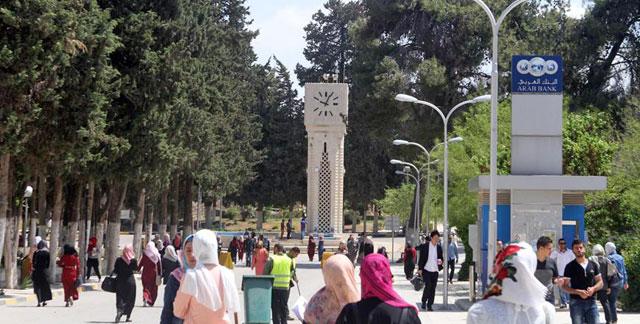You are here
‘Inadequate curricula, weak English skills hampering ICT students’ employment’
By Renad Aljadid - Jan 27,2019 - Last updated at Jan 27,2019

Students can be seen on the University of Jordan’s campus in this undated photo. The ICT Association of Jordan on Thursday said graduates from the ICT field are facing difficulty finding jobs in their sector due to universities’ curricula and a lack of English skills being taught (JT file photo)
AMMAN — Around 5,000 ICT students graduate from Jordanian universities annually, but less than 40 per cent of them are able to find jobs in their field, the ICT Association of Jordan (int@j) said on Thursday.
Int@j Chairman Bashar Hawamdeh said that in addition to the lack of opportunities, a major reason behind unemployment is that “insufficient skills” are taught in academic institutions that do not reflect the labour market’s needs.
He added that a majority of graduates do not have the necessary English language skills, which is an obstacle for people trying to join an ICT sector where most companies work with foreign or global partners.
Areej Azzam, a 30-year-old who holds a BA in Management Information Systems from a private university, said that she worked in her field for only one year, and then had no choice but to switch to secretarial and administrative jobs.
“There was a huge gap between what we learnt and the tasks we were assigned. I tried taking courses after graduation but they did not pay off,” she told The Jordan Times. “All of our [academic] books were in English, but the lectures were in Arabic. That’s why our communication skills are still weak even if we know the field’s terminology.”
Raghad Ibrahim, a computer science student at the University of Jordan, said that “our field is continuously changing and updating, so I think the university is only responsible for teaching the basics and we should continue learning after graduation based on job demands.”
Nijad Nijdawi, the dean of the Prince Abdullah Bin Ghazi College for IT at Al Balqa Applied University said that they have already recognised the issue and are working in unison with Royal Directives to enhance the potential of human resources and develop an academic curriculum to meet the labour market’s needs.
“All tracks are taught in English and students are offered free English courses to build their skills,” the professor told The Jordan Times, adding that “students are always encouraged and motivated to participate in local and international programmes and game design competitions. They [the students] end up seizing advanced places and trophies, which reflects the kind of education they receive”.
Al Balqa Applied University, which has more than 1,300 IT students at its main campus, has established a new college for artificial intelligence and information security to help ensure graduates are prepared to serve in the fields of cybersecurity, artificial intelligence and advanced technologies, according to Nijdawi.
In its statement, int@j called on academic institutions and experts to ensure that the courses and teaching mechanisms used are more practical than theoretical, in order to keep up with the future market’s labour needs.
Related Articles
The ICT Association of Jordan (int@j) on Tuesday said an agreement signed this week between Jordanian universities and the International Finance Corporation (IFC) will play a key role in reducing unemployment among ICT graduates.
AMMAN — The total number of ICT graduates in the 2020/2021 academic year in Jordan stands at 7,247, a study by the Information and Communica
Although women’s economic participation in most sectors in Jordan is 16 per cent or less, their involvement in the ICT sector is nearly double that figure, the ICT Association of Jordan (int@j) said Thursday.
















